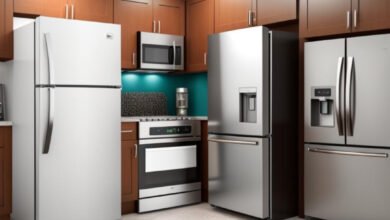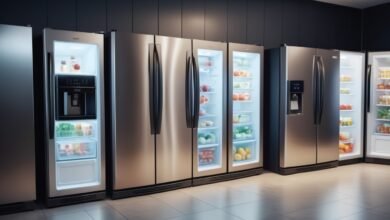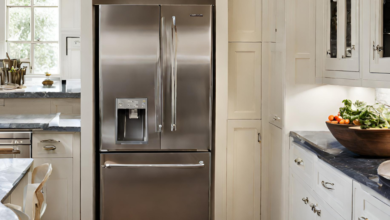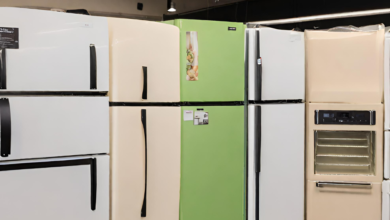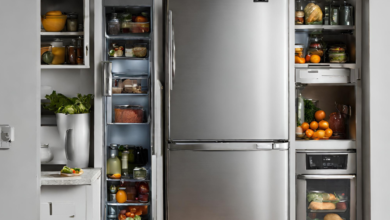Environmentally Friendly Refrigerator Choices: Navigating the Green Landscape
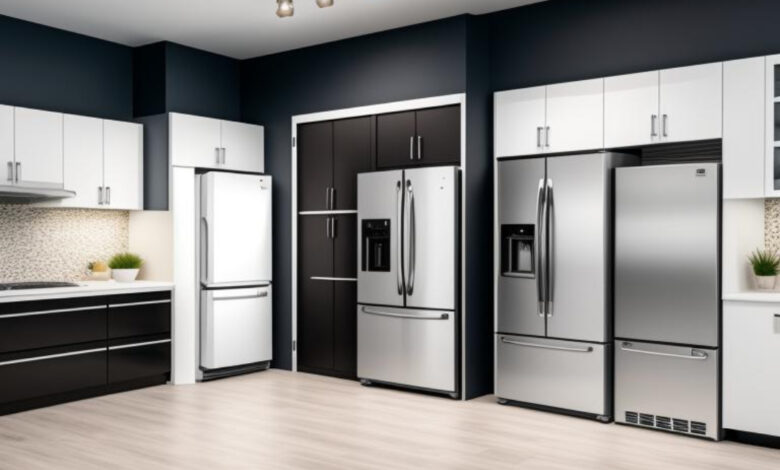
As environmental consciousness continues to grow, consumers are increasingly seeking appliances that align with sustainability goals. Among these, refrigerators play a significant role, being a crucial appliance in every household. In this comprehensive guide, we delve into the world of environmentally friendly refrigerator choices, exploring eco-friendly features, sustainable materials, and the brands leading the way in green innovation. Whether you prioritize energy efficiency, responsible manufacturing, or the use of eco-friendly materials, this guide will assist you in making an informed and environmentally conscious decision.
Understanding the Importance of Environmentally Friendly Refrigerators
Before delving into specific refrigerator choices, it’s crucial to understand why opting for environmentally friendly options matters. The impact of refrigerators on the environment can be substantial, considering factors such as energy consumption, refrigerants, and the lifecycle of the appliance.
1. Energy Efficiency:
Environmentally friendly refrigerators are designed with advanced technologies that maximize energy efficiency. This not only reduces electricity bills for consumers but also lowers the overall carbon footprint by minimizing energy consumption.
2. Refrigerant Choices:
Traditional refrigerants, such as hydrofluorocarbons (HFCs), contribute to greenhouse gas emissions. Environmentally friendly refrigerators often use alternative refrigerants with lower global warming potential, mitigating their environmental impact.
3. Sustainable Materials:
The construction of a refrigerator involves various materials. Environmentally friendly choices incorporate sustainable materials, such as recycled plastics and metals, to reduce resource depletion and promote responsible manufacturing.
4. Longevity and End-of-Life Considerations:
The lifespan of a refrigerator and its disposal at the end of life are critical factors in assessing its environmental impact. Durable construction and recyclability contribute to reducing waste and environmental harm.
Top Environmentally Friendly Refrigerator Choices
Let’s explore some of the top environmentally friendly refrigerator choices available in the market. These options consider energy efficiency, refrigerant choices, sustainable materials, and overall green initiatives by leading brands.
1. Samsung Solar Refrigerator
Overview:
Samsung’s Solar Refrigerator is a pioneering option that integrates solar power to enhance energy efficiency. It’s part of Samsung’s commitment to sustainable practices and reducing the carbon footprint.
Key Features:
- Solar Power Integration: The refrigerator comes with built-in solar panels on the top, harnessing sunlight to generate power and reduce reliance on traditional energy sources.
- Digital Inverter Compressor: Samsung’s digital inverter compressor adjusts its speed based on cooling demands, optimizing energy efficiency.
Sustainable Practices:
- Energy Star Certification: Many Samsung refrigerators, including the Solar Refrigerator, are Energy Star certified for meeting strict energy efficiency standards.
- Eco-Friendly Refrigerants: Samsung prioritizes the use of eco-friendly refrigerants with lower global warming potential.
2. LG Signature InstaView Door-in-Door Refrigerator
Overview:
LG’s commitment to sustainability is evident in the Signature InstaView Door-in-Door Refrigerator, combining innovative features with environmental responsibility.
Key Features:
- InstaView Door-in-Door: The feature allows users to see inside the refrigerator without opening the door, reducing temperature fluctuations and energy waste.
- Inverter Linear Compressor: LG’s inverter linear compressor enhances energy efficiency and reduces wear and tear for long-term sustainability.
Sustainable Practices:
- Energy Star Certification: Many LG refrigerators, including the Signature series, are Energy Star certified for superior energy efficiency.
- Recyclable Materials: LG emphasizes the use of recyclable materials in its refrigerator construction.
3. Whirlpool Smart French Door Refrigerator
Overview:
Whirlpool’s Smart French Door Refrigerator is a blend of smart technology and eco-friendly features, catering to consumers who prioritize both innovation and sustainability.
Key Features:
- Smart Connectivity: The refrigerator can be connected to a mobile app for remote monitoring and control, optimizing energy usage.
- Adaptive Defrost: Whirlpool’s adaptive defrost technology reduces energy consumption by defrosting only when necessary.
Sustainable Practices:
- Eco-Friendly Insulation: Whirlpool uses eco-friendly insulation materials in its refrigerator construction, enhancing energy efficiency.
- Sustainable Packaging: Whirlpool is known for its commitment to sustainable packaging practices, reducing waste throughout the product lifecycle.
4. GE Appliances Cafe French Door Refrigerator
Overview:
GE Appliances integrates green initiatives into its Cafe French Door Refrigerator, offering a combination of style and environmental responsibility.
Key Features:
- Customizable Temperature Settings: The refrigerator allows users to customize temperature settings for different compartments, optimizing energy usage.
- Advanced Filtration Systems: GE refrigerators often feature advanced water and air filtration, reducing the need for frequent replacements and promoting freshness.
Sustainable Practices:
- Eco-Friendly Refrigerants: GE Appliances prioritizes the use of eco-friendly refrigerants with lower environmental impact.
- Energy Star Certification: Many GE refrigerators are Energy Star certified, reflecting their commitment to energy efficiency.
5. KitchenAid Freestanding Bottom Freezer Refrigerator
Overview:
KitchenAid’s Freestanding Bottom Freezer Refrigerator combines luxurious design with energy-efficient features, appealing to consumers seeking both aesthetics and sustainability.
Key Features:
- Preserva® Food Care System: KitchenAid’s dual evaporators ensure precise temperature and humidity control, contributing to optimal food preservation with reduced energy consumption.
- LED Lighting: Energy-efficient LED lighting enhances visibility while consuming less energy.
Sustainable Practices:
- Eco-Friendly Insulation: KitchenAid uses environmentally friendly insulation materials, contributing to the overall energy efficiency of its refrigerators.
- Quiet Operation: Prioritizing a serene kitchen environment, KitchenAid appliances are designed for quiet operation, minimizing unnecessary energy consumption.
6. Sub-Zero Built-In All Refrigerator
Overview:
Sub-Zero, synonymous with premium appliances, brings sustainability to the forefront with its Built-In All Refrigerator, designed for those who prioritize luxury and green living.
Key Features:
- Dual Refrigeration System: Sub-Zero’s dual refrigeration system ensures precise temperature control in the refrigerator, minimizing energy consumption.
- Custom Panel Integration: Some Sub-Zero models allow custom panel integration for a seamless, built-in look.
Sustainable Practices:
- Energy-Efficient Compressors: Sub-Zero utilizes energy-efficient compressors that contribute to reduced energy consumption.
- Long Lifespan: Sub-Zero refrigerators are designed for durability, with a longer lifespan, reducing the need for frequent replacements.
7. Bosch Counter-Depth French Door Refrigerator
Overview:
Bosch, known for precision engineering, extends its commitment to sustainability with the Counter-Depth French Door Refrigerator, offering a perfect blend of performance and green features.
Key Features:
- VitaFresh Technology: Bosch refrigerators often feature VitaFresh technology, optimizing temperature and humidity levels to extend the freshness of fruits and vegetables with minimal energy consumption.
- Quiet Operation: Bosch prioritizes quiet operation, utilizing advanced insulation and sound-dampening technologies.
Sustainable Practices:
- Energy Efficiency: Bosch refrigerators are known for their energy-efficient designs, contributing to lower utility bills and reduced environmental impact.
- Eco-Friendly Materials: Bosch incorporates eco-friendly materials in its refrigerator construction, emphasizing sustainability throughout the product lifecycle.
8. Viking Professional Series Bottom-Freezer Refrigerator
Overview:
Viking, synonymous with professional-grade appliances, brings sustainability into the realm of high-performance refrigerators with its Professional Series Bottom-Freezer option.
Key Features:
- ProChill Temperature Management: Viking refrigerators often feature ProChill temperature management for precise control over cooling conditions with reduced energy consumption.
- Spacious Interiors: The refrigerator design includes spacious interiors for accommodating a variety of food items with ease.
Sustainable Practices:
- Commercial-Inspired Design: Viking refrigerators boast a commercial-inspired design, featuring robust construction and high-quality components for long-term reliability.
- Energy-Efficient Compressors: Viking utilizes energy-efficient compressors, contributing to reduced energy consumption and environmental impact.
Making an Informed Choice: Considerations and Tips
When navigating the landscape of environmentally friendly refrigerator choices, consider the following factors to make an informed decision:
1. Energy Efficiency Ratings:
Look for Energy Star and other energy efficiency certifications to ensure that the refrigerator meets stringent environmental standards.
2. Refrigerant Types:
Opt for refrigerators that use environmentally friendly refrigerants with lower global warming potential (GWP), such as hydrofluoroolefins (HFOs).
3. Sustainable Materials:
Consider models that incorporate sustainable and recycled materials in their construction, reducing the overall environmental impact.
4. Longevity and Durability:
Choose refrigerators known for their durability and longer lifespan, reducing the need for frequent replacements and minimizing waste.
5. Energy-Saving Features:
Explore models with advanced features like inverter compressors, smart temperature control, and adaptive defrost for optimized energy usage.
6. Smart Connectivity:
Some environmentally friendly refrigerators come with smart connectivity features, allowing remote monitoring and control to enhance energy efficiency.
7. Recycling Programs:
Check if the manufacturer offers recycling programs for old appliances, ensuring responsible disposal at the end of the refrigerator’s life.
Conclusion
In the pursuit of a more sustainable lifestyle, choosing an environmentally friendly refrigerator is a significant step. The top choices mentioned in this guide, including models from Samsung, LG, Whirlpool, GE Appliances, KitchenAid, Sub-Zero, Bosch, and Viking, showcase a diverse range of features and designs that cater to different preferences and needs.
As consumers, it’s essential to align personal priorities with the environmental features offered by each refrigerator. By considering energy efficiency, refrigerant choices, sustainable materials, and overall green initiatives, you can make a conscious choice that not only enhances your kitchen but also contributes to a healthier planet. As the demand for environmentally friendly appliances continues to rise, manufacturers are likely to innovate further, providing consumers with even more eco-conscious choices in the future.
